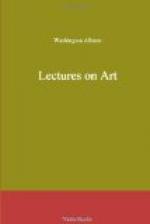It would seem, then, that, in relation to man, Beauty is the extreme point, or last summit, of the natural world, since it is in that that we recognize the highest emotion of which we are susceptible from the purely physical. If we ascend thence into the moral, we shall find its influence diminish in the same ratio with our upward progress. In the continuous chain of creation of which it forms a part, the link above it where the moral modification begins seems scarcely changed, yet the difference, though slight, demands another name, and the nomenclator within us calls it Elegance; in the next connecting link, the moral adjunct becomes more predominant, and we call it Majesty; in the next, the physical becomes still fainter, and we call the union Grandeur; in the next, it seems almost to vanish, and a new form rises before us, so mysterious, so undefined and elusive to the senses, that we turn, as if for its more distinct image, within ourselves, and there, with wonder, amazement, awe, we see it filling, distending, stretching every faculty, till, like the Giant of Otranto, it seems almost to burst the imagination: under this strange confluence of opposite emotions, this terrible pleasure, we call the awful form Sublimity. This was the still, small voice that shook the Prophet on Horeb;—though small to his ear, it was more than his imagination could contain; he could not hear it again and live.
It is not to be supposed that we have enumerated all the forms of gradation between the Beautiful and the Sublime; such was not our purpose; it is sufficient to have noted the most prominent, leaving the intermediate modifications to be supplied (as they can readily be) by the reader. If we descend from the Beautiful, we shall pass in like manner through an equal variety of forms gradually modified by the grosser material influences, as the Handsome, the Pretty, the Comely, the Plain, &c., till we fall to the Ugly.
There ends the chain of pleasurable excitement; but not the chain of Forms; which, taking now as if a literal curve, again bends upward, till, meeting the descending extreme of the moral, it seems to complete the mighty circle. And in this dark segment will be found the startling union of deepening discords,—still deepening, as it rises from the Ugly to the Loathsome, the Horrible, the Frightful,[1] the Appalling.
As we follow the chain through this last region of disease, misery, and sin, of embodied Discord, and feel, as we must, in the mutilated affinities of its revolting forms, their fearful relation to this fair, harmonious creation,—how does the awful fact, in these its breathing fragments, speak to us of a fallen world!
As the living centre of this stupendous circle stands the Soul of Man; the conscious Reality, to which the vast inclosure is but the symbol. How vast, then, his being! If space could measure it, the remotest star would fall within its limits. Well, then, may he tremble to essay it even in thought; for where must it carry him,—that winged messenger, fleeter than light? Where but to the confines of the Infinite; even to the presence of the unutterable Life, on which nothing finite can look and live?




